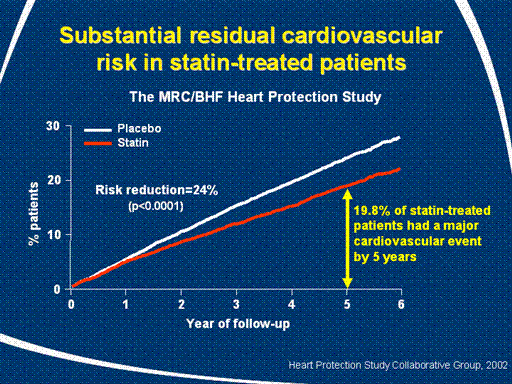| front |1 |2 |3 |4 |5 |6 |7 |8 |9 |10 |11 |12 |13 |14 |15 |16 |17 |18 |19 |20 |21 |22 |23 |24 |25 |26 |27 |28 |29 |30 |31 |32 |33 |34 |35 |36 |review |
 |
The MRC/BHF Heart
Protection Study was one of the landmark trials that have established
the
place of statins in the management of
hypercholesterolaemia. A population of 20,536 patients at high
cardiovascular risk through the presence of coronary disease, other
arterial disease or diabetes were randomly assigned to treatment with
simvastatin or placebo for an average of 5 years.
The intervention was
highly effective, with a significant reduction in the risk of
cardiovascular
events of 24%. However, a majority of cardiovascular
risk remains unaffected after statin treatment, and almost 20% of
patients in the statin group had a major cardiovascular event during the
5-year follow-up period.
Total cholesterol
and LDL-cholesterol were markedly reduced by treatment with the statin
(mean
changes from baseline of –1.2 mmol/L [–46 mg/dL] and
–1.0 mmol/L [–39 mg/dL],
respectively). However, other lipid components, such as triglycerides or
HDL-cholesterol, impact importantly on cardiovascular risk and were
changed only slightly in the study (mean changes from baseline of –0.3
mmol/L [–27 mg/dL] and 0.03 mmol/L [1 mg/dL], respectively).
We may need to look
beyond effects on LDL-cholesterol to achieve greater results in the
management of overall cardiovascular risk.
|